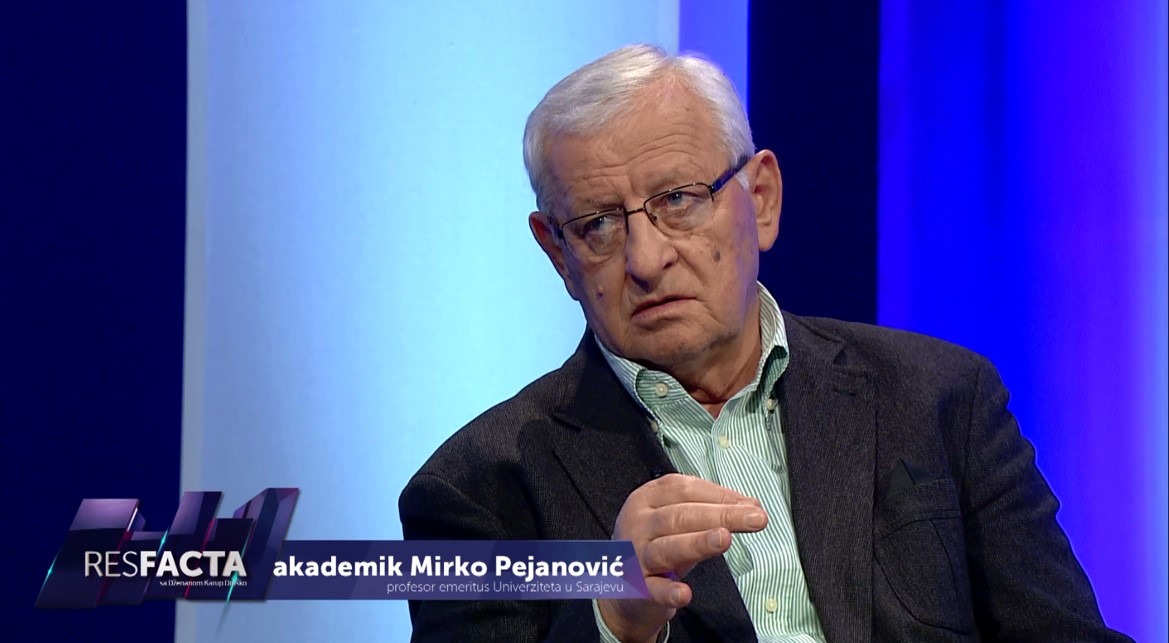Academician Pejanović: NATO's intervention contributed to peace in BiH
:
Piše: Dženana Karup Druško
Piše: Dženana Karup Druško
Piše: Dženana Karup Druško
Piše: Dženana Karup Druško
Piše: Dženana Karup Druško
Piše: Dženana Karup Druško
Piše: Dženana Karup Druško
Piše: Dženana Karup Druško
:

As a guest in the program Res Facta with Dženana Karup Druško, where the relations between NATO and Bosnia and Herzegovina were discussed by Prof. Dr. Dijana Gupta, from the University Džemal Bijedić from Mostar, and President of the Atlantic Council in BiH, Prof. Dr. Nedžad Korajlić, Dean of the Faculty for Criminalistics, Criminology and Security Studies of the Sarajevo University, Academician Prof. Dr. Mirko Pejanović, when asked why NATO intervention in BiH and Serbia is often used as argument against NATO membership, while at the same time failing to consider the causes that had led to such intervention but only its consequences, said among other things:
- This is going back to our past. Let’s take the city of Sarajevo and its siege that lasted three and half years, and two million shells fired at the city and its civilians. It took several years of effort and involvement of international community, including the NATO Alliance, to de-block Sarajevo, to move away the heavy artillery that had been killing people, destroying structures, paralyzing life... And now we should forget that, right? As it had never happened? Well, it happened, it certainly happened.
The role of NATO alliance gained special importance at the time around preparations of the Dayton Peace Agreement. At that time, the airstrikes were used to paralyze centers for observation and notification at specific locations, and some warehouses of the Republika Srpska Military, etc., leaving them no choice but to negotiate. NATO was a factor of military pressure which combined with the pressures by the United States of America in preparations for d negotiations to find a peaceful solution. Why? Because Karadžić and Mladić had been refusing any peaceful resolution. This is additionally confirmed by the fact that Patriarch Pavle intervened in his capacity of the highest spiritual and moral authority, and it is good that he had intervened to exclude Karadžić from negotiations, as this was what those who had been preparing the negotiations wanted, and to give Milošević the authority to represent, in addition to the then Federal Republic of Yugoslavia, also the Republika Srpska.
NATO is an integral part of Euro-Atlantic geopolitics which, in the geopolitical framework where it operates, contributes to establishing peace where there is no peace, and once established, to implement and maintain it.

In the program, Academician Pejanović also discussed the processes that had led to Bosnia and Herzegovina getting in the situation where, in spite of clear commitment from several years ago to move towards European and Atlantic integrations, now has found itself imposed with some different alternatives, and under influence of Russia and some other countries; this is also something Prof. Dr. Korajić talked about.
In 2004 and 2005, representatives of international community and our domestic authorities at the highest level of BiH worked on a process of reform of armed component that had existed in the war. This was one of the most successful reforms in the post-Dayton period. As a result of that effort, which involved international community stakeholders, BiH got its Ministry of Defense and unified armed forces. Of course, civilian command lies with the Presidency of BiH.
At that time, the policy of the Presidency of BiH, which formulates, designs and leads foreign policy, was established, as well as the foreign policy strategy, and based on that, the laws were adopted. The Strategy foresees Euro-Atlantic integration of BiH, and BiH joining the Euro-Atlantic institutions, meaning the European Union and NATO alliance. Also at that time the Law on Defense of BiH was adopted, and one of provisions of this law specifically provided that this was its strategic goal and that the Armed Forces would implement reforms that would lead to integration with NATO.
There were some delays there, caused by the question whether we can register some military barracks as state property or not, and time was lost. For that, we in BiH are to blame, but also the conditions that had been posed by the leadership of the NATO Alliance. However, it has started to change a little, we have now arrived at a new reform program that is related to the NATO alliance, because we had received the MAP long time ago and with this new program we have practically embarked on the reforms that will lead us to the invitation to become member of the NATO Alliance. This process may take longer or not so long. But at all these times, since the time never stops, other military and political entities want to exert influence on this region, and they do not hide it and they continue using their own methods to achieve this.
We have seen a trend since perhaps 2006 of processes of BiH integration slowing down, we saw increased influence of the Russian Federation, and, to some extent, Turkey, there is even talk about growing influence of China. Recently, those who are making decisions about the policies of the NATO Alliance, as well as everybody else, have realized this fact, and are currently making efforts to speed up the integration process. Who had, in particular, helped all these other influences? Well, those were helped by our domestic political powers that are trying to use them to achieve double benefit for themselves: one, they are important for their electorate, their voters, so that they can say that they have support of these big powers; and second, to achieve some war goals that had not been achieved at the time of war.